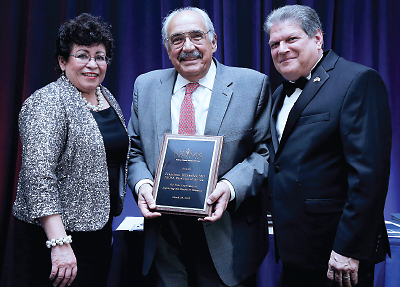New Medical School Hopes to Address Community’s Mental Health Needs
Abstract
Psychiatrist Francisco Fernandez, M.D., the first dean of the University of Texas Rio Grande Valley School of Medicine and a recent recipient of the National Hispanic Medical Association’s Physician of the Year Award, describes his hopes for the new school.
Francisco Fernandez, M.D., has a vision that one day the Rio Grande Valley at the southernmost tip of Texas will not only shake its reputation as one of the sickest regions in the nation—known for its staggering obesity and diabetes rates affecting a mostly Mexican-American population—but also become one of the healthiest places in the United States.

For his contributions to the health of Hispanic communities, Francisco Fernandez, M.D., was named Physician of the Year at the National Hispanic Medical Association’s (NHMA) Leadership Awards Gala in March. Fernandez, who is the founding dean of the University of Texas Rio Grande Valley School of Medicine, is flanked by Elena Rios, M.D. (left), president and CEO of the NHMA, and Sam Arce, M.D., chair of the NHMA board of directors.
Fernandez is the inaugural dean and vice president for health affairs at the newly established University of Texas Rio Grande Valley (UTRGV) School of Medicine. He is also a professor of psychiatry.
Prior to accepting his new post, Fernandez spent 12 years as the chair of psychiatry and behavioral neurosciences and a professor of community and family health at the University of South Florida Morsani College of Medicine in Tampa, Fla.
Fernandez recently traveled to Washington, D.C., to accept the National Hispanic Medical Association’s (NHMA) Physician of the Year Award to a standing ovation at the organization’s 19th Annual Leadership Awards Gala. The NHMA is a nonprofit association based in Washington, D.C., that represents the interests of about 50,000 licensed Hispanic physicians in the United States.
“We presented the award to Dr. Fernandez based on his longstanding career as an academic physician, [his accomplishments as] the third Hispanic dean of a medical school on the U.S. mainland,” and his leadership in creating a medical school in the Rio Grande Valley that will enhance care of many Hispanics, NMHA President and CEO Elena Rios, M.D., M.S.P.H., told Psychiatric News.
Fernandez told Psychiatric News that he values his years of membership and work with the NHMA. “So many people here have been enormously supportive of my work in HIV and have served as role models for me,” he noted.
The coming months will be filled with activity related to the startup of the medical school, including a site visit by the Liaison Committee of Medical Education, the organization responsible for granting accreditation status to the school. Once approval is granted, the first medical school class could matriculate as early as the summer of 2016. Fernandez will also work with the Accreditation Council for Graduate Medical Education to obtain accreditation for the school’s residency programs.
Part of the mission for UTRGV, Fernandez said, will be to find solutions to the area’s health problems, which include drug and alcohol dependence, depression, degenerative disorders, and domestic violence in addition to complications related to obesity. He noted that the area’s residents are poor and largely underserved in terms of access to health services.
He also noted that all those involved in the existing Rio Grande Valley academic community, including students, staff, and educators, “define community engagement in their actions and carry the mission of the medical school in their hearts day in and day out.” ■



